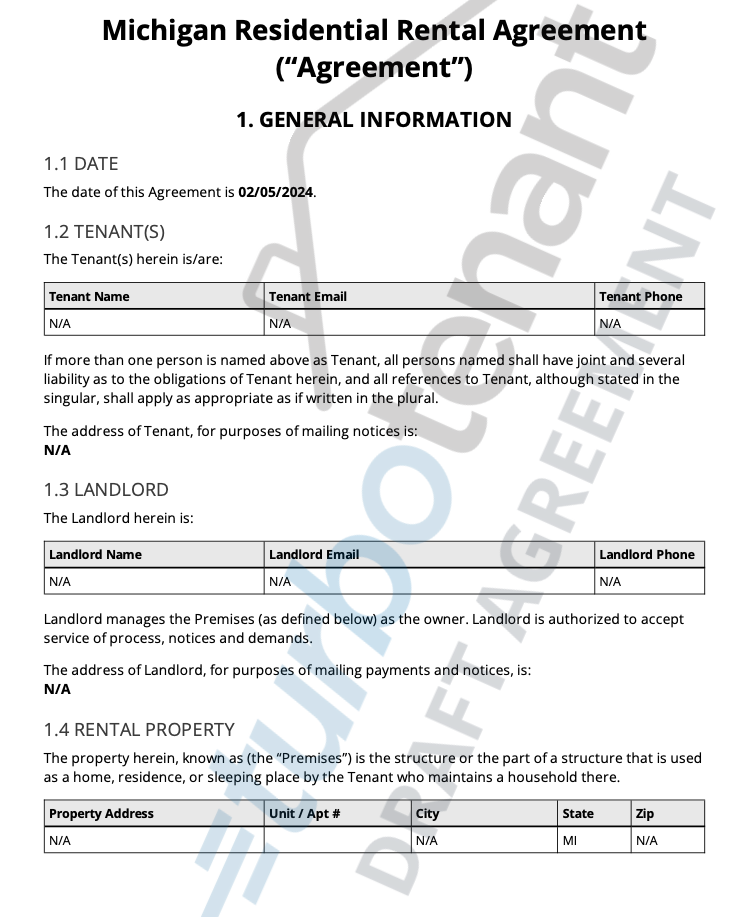
When it comes to renting out property in Michigan, having a comprehensive and legally compliant lease agreement is crucial. This ensures that the document not only keeps you compliant with Michigan laws but also covers various aspects of the landlord-tenant relationship, making the leasing process smooth and clear for both parties involved.
Section 1 – Custom to You
The lease agreement kicks off with customizable details that pertain specifically to your rental situation. This includes information about the landlord and tenant, rental amount, utility responsibilities, and more. Such customization ensures that the lease accurately reflects the unique aspects of your rental property and agreement.
Key Features in Section 1
- Additional Provisions: This area allows for the inclusion of property-specific rules or local clauses that might be necessary. It is recommended to review these provisions with a legal professional to ensure compliance.
- Lost Key Policy: It mandates that tenants cover the full cost of rekeying the property if all keys are not returned upon moving out.
Section 2 – Specific to Michigan
This section incorporates clauses that are unique to Michigan, ensuring the lease remains within the bounds of local law. These clauses cover a variety of areas and are designed to protect the interests of both landlords and tenants.
Important Clauses in Section 2
- Late Fees (Section 2.1): There are no statutory regulations on late rent in Michigan except it should be “reasonable” so we have set this as 5% of the undue balance can be charged if rent is not paid by the 5th day. .
- Occupancy Limits and Guests (Section 2.5): Specifies that only tenants and certain dependents may occupy the premises, with guests allowed under specific conditions.
- Notification of Repairs (Section 2.7): Tenants must cover costs for damages resulting from their negligence and promptly report serious issues to the landlord.
- Notifying of Absences (Section 2.9): Tenants are required to inform the landlord if they will be away from the property for more than seven days.
- Michigan Truth in Renting Notice (Sect. 2.15)
- Security Deposits require the name and location of the bank account to be identified (Sect. 2.4).
Section 3 – General Clauses for Best Practices
This section includes standard clauses that are common to most lease agreements, emphasizing best practices and ensuring a healthy landlord-tenant relationship.
Essential Clauses in Section 3
- Subletting (Section 3.1): Clearly prohibits tenants from subleasing the property without the landlord’s written consent.
- Altering or Improving the Property (Section 3.2): Requires tenants to obtain written approval from the landlord before making any alterations or improvements to the property.

FAQ
What constitutes a late fee in Michigan?
In Michigan, landlords can charge a late fee of 5% of the unpaid rent if it’s not paid by the fifth day of the month.
How should security deposits be handled in Michigan?
The maximum allowed security deposit in Michigan is 1.5 times the monthly rent. Landlords must disclose the location of the depository or bank where the deposit is held. Upon lease termination, landlords have 30 days to provide an itemized list of damages and return the remaining deposit amount.
What are the requirements for notifying of repairs?
Tenants must pay for damages caused by their negligence and immediately notify the landlord of serious property issues. Landlords are responsible for repairs necessary for a healthy and safe living environment.
What should I include in the additional provisions section?
This section can include any property-specific rules, necessary local clauses, or other specifics you want to outline. It’s advised to review these provisions with a lawyer to ensure compliance with Michigan law.
TurboTenant Michigan Lease Agreements
The TurboTenant Michigan Lease Agreement is a comprehensive tool designed to simplify the leasing process for landlords in Michigan. By incorporating legal expertise and landlord experiences, TurboTenant ensures that the lease agreement is not only compliant with Michigan laws but also addresses the nuances of the landlord-tenant relationship. While the template covers a wide range of scenarios, landlords are encouraged to consult with legal professionals when adding unique provisions or when dealing with complex rental situations. TurboTenant facilitates a smoother rental experience by providing a robust, customizable, and legally sound lease agreement template for Michigan landlords.
Michigan Resources


